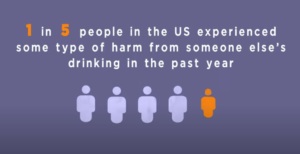Uncovering New Alcohol Use Harms—and Opportunities to Decrease Them
Highlights

Each year, one in five U.S. adults—an estimated 53 million people—experience harm because of someone else’s drinking, according to a 2019 study released by the National Alcohol Research Center, part of PHI’s Alcohol Research Group.
-
Focus Areas
Alcohol, Tobacco, Drugs & Mental Health, Chronic Disease Prevention, Global Health, Women, Youth & Children -
Issues
Alcohol -
Expertise
Public Policy Development, Research – Survey
Each year, one in five U.S. adults —an estimated 53 million people—experience harm because of someone else’s drinking.
 Using data from the National Alcohol Survey, the National Alcohol Research Center (housed at PHI’s Alcohol Research Group) found that 21% of women and 23% of men experienced harm because of someone else’s drinking in the last 12 months.
Using data from the National Alcohol Survey, the National Alcohol Research Center (housed at PHI’s Alcohol Research Group) found that 21% of women and 23% of men experienced harm because of someone else’s drinking in the last 12 months.
These harms could be threats or harassment, ruined property or vandalism, physical aggression, harms related to driving, or financial or family problems. Women were more likely to report financial and family problems, while men were more likely to report ruined property, vandalism, and physical aggression. The most common harm was threats or harassment, reported by 16% of survey respondents.
The 2019 study made headlines around the world, and was reported by 42 media outlets including The Guardian and Reuters.
A related study, also released by the Alcohol Research Group, looked at state policies to determine if stronger alcohol controls have an effect on secondhand harms. The study looked state by state, over a 15 year period, to see who was being harmed and whether more restrictive alcohol policies could reduce secondhand risks. The research demonstrated that Americans under age forty who live in states with more restrictive policies have a 16% lower risk of being hurt by someone who is drinking.
The study shows that public policies such as limiting alcohol availability, taxing alcohol purchasing and tougher drinking-and-driving laws should not only consider the impact on curbing problem drinkers but also the effects of saving family, friends and innocent bystanders from secondhand harms. Advocates in states with less restrictive laws can point to the study as strong evidence of the significant benefits to all residents from adopting tougher alcohol controls.
See the press release here.
Work With Us
You change the world. We do the rest. Explore fiscal sponsorship at PHI.
Support Us
Together, we can accelerate our response to public health’s most critical issues.
Find Employment
Begin your career at the Public Health Institute.
